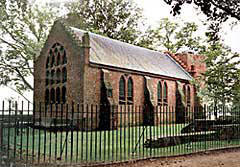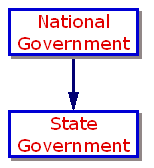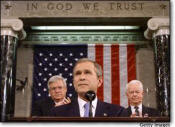|
Federalism
Federalism is
famously regarded as a very difficult subject for beginning
government students to understand. Your teacher thinks this is
nonsense. It's a simple concept, but a critical one.
Where does power lie?
In the United States, we have an intentionally
complex, but not hard to understand, answer. The answer is: in many
places.
The complexity was not born at the Constitutional
Convention, but modified there. It
began with our British heritage.
King George III was a monarch, but not an absolute
one. He had to contend with Parliament - a bicameral one, with the
House of Commons and the House of Lords - a an entrenched court
system dedicated to upholding the rights of Englishmen. What does
this have to do with federalism? Essentially nothing, but it had a
serious influence on the separation of powers - legislative,
executive, and judicial - in our own systems of government.
 The
important word in the preceding paragraph is systems.
The British Crown was too busy, and too wise, to try to govern the
minutiae of activities in Virginia, for example, from London. So
they granted a limited degree of self government to the colonies.
Virginia created the House of Burgesses (the first American
legislature) to aid the royal governor in governing the colony,
still under the British Crown. The
important word in the preceding paragraph is systems.
The British Crown was too busy, and too wise, to try to govern the
minutiae of activities in Virginia, for example, from London. So
they granted a limited degree of self government to the colonies.
Virginia created the House of Burgesses (the first American
legislature) to aid the royal governor in governing the colony,
still under the British Crown.
So, even as colonies, Americans were familiar with
two types of power divisions:
-
a
horizontal separation of
powers at the same level - King, parliament, and courts, and
-
a
vertical division of powers -
national (the government in London) and colonial (the government
in Jamestown)
It is a form of this vertical
division of governmental power that is called federalism.
| |
 |
"Federalism
refers to a political system in which there are local
(territorial, regional, provincial, state, or municipal) units
of government, as well as a national government, that can make
final decisions with respect to at least some governmental
activities and whose existence is specially protected. Almost
every nation in the world has local units of government of some
kind, if for no other reason than to decentralize the
administrative burdens of government. But these governments are
not federal unless the local units exist independent of the
preferences of the national government and can make decisions on
at least some matters without regard to those preferences."
Wilson, American
Government (2001), 50.
|
Notice the last sentence in the
quotation from Wilson. The government in the colonial period was not
federal because the colonial governments served at the discretion of
the Crown.
When the colonies declared
independence, however, they became (in the language of the
Declaration) "free and independent states." These states retained
their sovereignty when they entered into a "firm league of
friendship" under the Articles of Confederation.
When Madison authored the Virginia
Plan he proposed a truly national government
because that's what he favored. After the modifications to the
Virginia Plan in the Convention, however, the system became truly
federal. The national government created is one of
limited powers. The 10th Amendment makes manifest what was
already clear - that other powers were reserved
by the states. The Convention unanimously changed the wording of the
Virginia Plan from "national government" to "government of the
United States." Still, the "supremacy clause" of the Constitution
(Art. VI, cl.2) makes it clear where supreme power lies:
This Constitution, and the Laws
of the United States which shall be made in Pursuance thereof; and
all Treaties made, or which shall be made, under the Authority of
the United States, shall be the supreme Law of the Land; and the
Judges in every State shall be bound thereby, any Thing in the
Constitution or Laws of any State to the Contrary notwithstanding.
A Living Constitution?
Your teacher hates that term. As
Justice Antonin Scalia said recently, the Constitution is not a
living thing, it's a legal document. However, there's no doubt that
it is one, in the words of Justice John Marshall "intended to endure
for ages to come and consequently to be adapted to the various
crises of human affairs." [McCulloch v. Maryland]
The greatest crisis in our history
was a fight over federalism itself. Even the names illustrate the
divide. Was it a "civil war" or a "war between the states?"
Northerners perceived a rebellion against the Constitutional order
and the natural rights of men. Southerners (more properly, white
southerners) perceived a defense against a national government that
had perverted the Constitutional order. The issue was decided -
primarily - with the 53,000 lives spent at Gettysburg.
Over the years since the national
government has greatly expanded in size and power, partly at the
expense of the states. More recently some Americans have attempted
to reverse this trend, perceiving a national government out of its
proper sphere. Robert Dole - the Republican presidential nominee in
1996 - campaigned, he said, "to restore the 10th Amendment." Even
his opponent - President Clinton - had proclaimed that "the era of
big government is over."
But then came September 11th. The
national response was led by a President even more dubious about
national power than Dole. Yet this crisis prompted another
tremendous expansion of the national role - the Patriot Act and the
Department of Homeland Security. So federalism continues to evolve.
Notes:
A government
in which all power belongs to the central government is called,
these days, a unitary system.
Powers
belonging only to the national government are called delegated
powers or enumerated powers. Many are listed in Art.I,
§8.
They include
- printing money
- regulating interstate and
international commerce
- making treaties
- declaring war
Powers that
belong only to the states are called reserved powers. They include
issuing licenses and regulating intrastate commerce.
Powers shared by the national and
state governments are called concurrent powers. They include
taxation, operating courts, and borrowing money.
|

